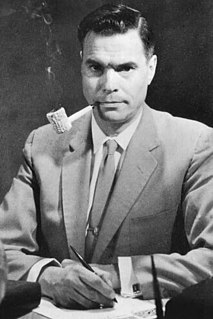A Quote by George Lincoln Rockwell
A man who knows a thing, recognizes a given danger, and sees with his own eyes the possibility of a remedy, damned well has the duty and the obligation not to work 'silently', but to stand up openly against the evil and for its cure. If he does not do so then he is a faithless, miserable weakling who fails either from cowardice or from laziness and incompetence....Every last agitator who possesses the courage to defend his opinions with manly forth-rightness, standing on a tavern table among his adversaries, accomplishes more than a thousand of these lying, treacherous sneaks.
Quote Topics
Adversaries
Against
Among
Courage
Cowardice
Cure
Danger
Defend
Does
Duty
Either
Every
Evil
Eyes
Fails
Faithless
Forth
Given
His
Incompetence
Knows
Last
Laziness
Lying
Man
Manly
Miserable
More
Obligation
Openly
Opinions
Own
Possesses
Possibility
Remedy
Sees
Stand
Stand Up
Standing
Table
Tavern
Than
Then
Thing
Thousand
Treacherous
Up
Well
Work
Related Quotes
The wise man does nothing but what can be done openly and without falseness, nor does he do anything whereby he may involve himself in any wrong-doing, even where he may escape notice. For he is guilty in his own eyes before being so in the eyes of others; and the publicity of his crime does not bring him more shame than his own consciousness of it.
The man who works recognizes his own product in the world that has actually been transformed by his work. He recognizes himself in it, he sees his own human reality in it he discovers and reveals to others the objective reality of his humanity of the originally abstract and purely subjective idea he has of himself
There is no tongue to speak his eulogy;
Too brightly burned his splendour for our eyes:
Far easier to condemn his injurers,
Than for the tongue to reach his smallest worth.
He to the realms of sinfulness came down,
To teach mankind; ascending then to God,
Heaven unbarred to him her lofty gates,
To whom his country hers refused to ope.
Ungrateful land, to its own injury
Nurse of his fate! Well too does this instruct,
That greatest ills fall to the perfectest.
And 'midst a thousand proofs, let this suffice,
That, as his exile had no parallel,
So never was there man more great than he.
Where no man thinks himself under any obligation to submit to another, and, instead of co-operating in one great scheme, every one hastens through by-paths to private profit, no great change can suddenly be made; nor is superior knowledge of much effect, where every man resolves to use his own eyes and his own judgment, and every one applauds his own dexterity and diligence, in proportion as he becomes rich sooner than his neighbour.
I like a person who knows his own mind and sticks to it; who sees at once what is to be done in given circumstances and does it. He does not beat about the bush for difficulties or excuses, but goes the shortest and most effectual way to work to attain his own ends, or to accomplish a useful object.
The whole gospel of Karl Marx can be summed up in a single sentence: Hate the man who is better off than you are. Never under any circumstances admit that his success may be due to his own efforts, to the productive contribution he has made to the whole community. Always attribute his success to the exploitation, the cheating, the more or less open robbery of others. Never under any circumstances admit that your own failure may be owing to your own weakness, or that the failure of anyone else may be due to his own defects - his laziness, incompetence, improvidence, or stupidity.
Man is at his furthest remove from the animal as a child, his intellect most human. With his fifteenth year and puberty he comes astep closer to the animal; with the sense of possessions of his thirties (the median line between laziness and greediness), still another step. In his sixtieth year of life he frequently loses his modesty as well, then the septuagenarian steps up to us as a completely unmasked beast: one need only look at the eyes and the teeth.
There is a fundamental moral difference between a man who sees his self-interest in production and a man who sees it in robbery. The evil of a robber does not lie in the fact that he pursues his own interests, but in what he regards as to his own interest; not in the fact that he pursues his values, but in what he chose to value; not in the fact that he wants to live, but in the fact that he wants to live on a subhuman level.
































